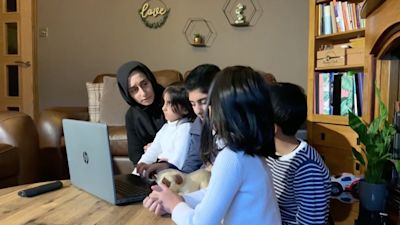Covid: How digital poverty is putting pressure on schools and families to keep their children learning under lockdown

Video report by ITV News Correspondent Ben Chapman
Words by ITV News North of England Producer Jade Liversidge and ITV News Correspondent Ben Chapman
"The internet was supposed to be the great leveller. Instead, it’s now the great divider.”
Head teacher Paul Urry has spent months campaigning for devices for children at his primary school, in one of the most deprived parts of Bradford.
Since the first lockdown in Spring, Paul made it his mission to eradicate digital poverty and started an 'internet4all' campaign to raise thousands of pounds to provide devices for his students.
But he’s received just six new laptops from the government. He has 450 pupils.
"I need a device not just for a handful of children, single digit numbers, I need it for all of them," he tells us. "I need to create equality for the children that we have here and we will do the rest."
His school, St Stephen’s Primary, has embraced online teaching like few others.
Paul shows us his ‘green screen’ studio, where he produces colourful videos to send to families.
I watch as Kelly, one of the teachers, records a phonics session, complete with animated flash cards.
And yet they know that many of their pupils won’t even see it.
Fewer than 10% of them have access to wi-fi at home on their own device. Around 30% have to make do with their parents’ mobile phone on a data plan that often runs out quickly.
"From our perspective as teachers, we‘ve adapted a lot since the last lockdown," he says.
"But from a national perspective, there’s been very limited progress. We need to have a better national plan for ending this gulf in access."
Today the school was empty, but busy with support staff calling families to ask what internet access and devices they have.
Teachers are preparing the ‘remote learning’ courses they now have to provide, but much of it is on old-fashioned paper.
For Ayani Mirza, living in a two bedroomed terraced house a few streets away, lockdown fills her with dread.
She has four children, aged between four and 11, but only one laptop.
She speaks about about the pressure she feels to get her kids learning at home.
"Sometimes when they start arguing and fighting over the device, I do end up in tears, trying to explain that this is all we have.
"When you have more than one child at different stages of their academic life, it’s not as easy as 'it’s remote learning, teach them from home'.”
Her fears are well-founded. After the last lockdown, teachers could tell apart the children who had good access to remote learning, and those who did not.
Many families don’t have broadband. Many parents don’t know how to use technology.
Many don’t speak English as their first language, and many more simply don’t know how to teach.
"The gap just keeps on widening," says Helen Loughlin, a year 3 teacher. "Now we’re faced with another lockdown and we know that a lot of our children are still in that same position."
On Tuesday, the government announced a new scheme to increase data allowances on mobile devices on certain networks so that children without broadband can access remote education.
The Department for Education (DfE) says schools are "well-prepared to deliver remote education", with 560,000 laptops and tablets given to schools already last year, with a further 440,000 now promised.
But the head teacher here believes it is already too late.
"Children won’t make progress during the lockdown," Paul says. "All we’re trying to do now is reduce regression."